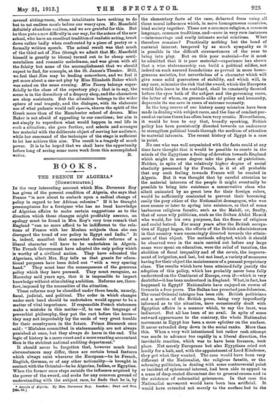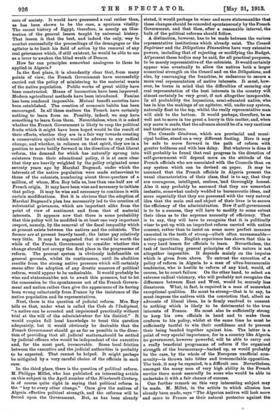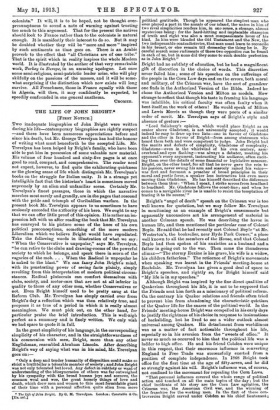BOOKS.
THE FRENCH IN ALGERIA.*
[COMMUNICATED.]
IN the very interesting account which Mrs. Devereux Roy has given of the present condition of Algeria, she says that France "is now about to embark upon a radical change of policy in regard to her African colonies." If it be thought presumptuous for a. foreigner who has no local knowledge of Algerian affairs to make certain suggestions as to the direction which those changes might profitably assume, an apology must be found in Mrs. Roy's very true remark that England " can no more afford to be indifferent to the rela- tions of France with her Moslem subjects than she can disregard the trend of our policy in Egypt and India." It is, indeed, manifest that somewhat drastic reforms of a liberal character will have to be undertaken in Algeria. The French Government have adopted the only policy which is worthy of a civilized nation. They have educated the Algerians, albeit Mrs. Roy tells us that grants for educa- tional purposes have been doled out "with a very sparing hand." They must bear the consequences of the generous policy which they have pursued. They must recognize, as Macaulay said years ago, that it is impossible to impart knowledge without stimulating ambition. Reforms are, there- fore, imposed by the necessities of the situation.
These reforms may be classified under three heads, namely, fiscal, judicial, and political. The order in which changes under each bead should be undertaken would appear to be a matter of vital importance. If responsible French statesmen make a mistake in this matter—if, to use the language of proverbial philosophy, they put the cart before the horse— they may not improbably lay the seeds of very great trouble for their countrymen in the future. Prince Bismarck once said : "Mistakes committed in statesmanship are not always punished at once, but they always do harm in the end. The logic of history is a more exact and a more exacting accountant than is the strictest national auditing department."
It should never he forgotten that, however much local circumstances may differ, there are certain broad features which always exist wherever the European—be he French, English, German, or of any other nationality—is brought in contact with the Oriental—be he Algerian, Indian, or Egyptian. When the former once steps outside the influence acquired by the power of the sword, and seeks for any common ground of understanding with the subject race, be finds that he is, by
• Aspects of Algeria. By Mrs. Devereux Boy. London : Dent and Son. [lea. GI]
the elementary facts of the case, debarred from using all those moral influences which, in more homogeneous countries, bind society together. These are a common religion, a common language, common traditions, and—save in very rare instances —intermarriage and really intimate social relations. What therefore remains ? Practically nothing but the bond of material interest, tempered by as much sympathy as it is possible in the difficult circumstances of the case to bring into play. But on this poor material—for it must be admitted that it is poor material—experience has shown that a wise statesmanship can build a political edifice, not indeed on such assured foundations as prevail in more homo- geneous societies, but nevertheless of a character which will give some solid guarantees of stability, and which will, in any case, minimize the risk that the sword, which the European would fain leave in the scabbard, shall be constantly flaunted before the eyes both of the subject and the governing races, the latter of whom, on grounds alike of policy and humanity, deprecate its use save in cases of extreme necessity.
In the long course of our history many mistakes have been made in dealing with subject races, and the line of conduct pur- sued at various times has often been very erratic. Nevertheless, it would be true to say that, broadly speaking, British policy has been persistently directed towards an endeavour to strengthen political bonds through the medium of attention to material interests. The recent history of Egypt is a case in point.
No one who was well acquainted with the facts could at any time have thought that it would be possible to create in the minds of the Egyptians a feeling of devotion towards England which might in some degree take the place of patriotism. Neither, in spite of the relatively higher degree of social elasticity possessed by the French, is it at all probable that any such feeling towards France will be created in Algeria. But it was thought that by careful attention to the material interests of the people it might eventually be possible to bring into existence a conservative class who albeit animated by no great love for their foreign rulers, would be sufficiently contented to prevent their becoming easily the prey either of the Nationalist demagogue, who was sure sooner or later to spring into existence, or that of some barbarous religious fanatic, such as the Mandi, or, finally, that of some wily politician, such as the Sultan Abdul Humid who would, for his own purposes, fan the flame of religious and racial hatred. For many years after the British occupa- tion of Egypt began, the efforts of the British administrators in that country were unceasingly directed towards the attain- ment of that object. The methods adopted, which it should be observed were in the main carried out before any large sums were spent on education, were the relief of taxation, the abolition of fiscal inequality and of the corvee, the improve- ment of irrigation, and last, but not least, a variety of measures having for their object the maintenance of a peasant proprietary class. The results which have been attained fully justify the adoption of this policy, which has probably never been fully understood on the Continent of Europe, even if—which is very doubtful—it has been understood in England. What, in fact, has happened in Egypt? Nationalists have enjoyed an excess of licence in a free press. The Sultan has preached pan-Islamism. The usual Oriental intrigue has been rife. British politicians and a section of the British press, being very imperfectly informed as to the situation, have occasionally dealt with Egyptian affairs in a manner which, to say the least, was indiscreet. But all has been of no avail. In spite of some outward appearances to the contrary, the whole Nationalist movement in Egypt has been a mere splutter on the surface. It never extended deep down in the social ranks. More than this. When a very well intentioned but rather rash attempt was made to advance too rapidly in a liberal direction, the inevitable reaction, which was to have been foreseen, took place. Not merely Europeans but also Egyptians cried out loudly for a halt, and, with the appointment of Lord Kitchener, they got what they wanted. The case would have been very different if the Nationalist, the religious fanatic, or the scheming politician, in dealing with some controversial point or incident of ephemeral interest, had been able to appeal to a mass of deep-seated discontent due to generalcauses and to the existence of substantial grievances. In that case the Nationalist movement would have been less artificial. It would have extended not merely to the surface but to the core of society. It would have possessed a real rather than, as has been shown to be the case, a spurious vitality. The recent history of Egypt, therefore, is merely an illus- tration of the general lesson taught by universal history. That lesson is that the best, and indeed the only, way to combat successfully the proceedings of the demagogue or the agitator is to limit his field of action by the removal of any real grievances which, if still existent, he would be able to use as a lever to awaken the blind wrath of Demos.
How far can principles somewhat analogous to these be applied in Algeria ?
In the first place, it is abundantly clear that, from many points of view, the French Government have successfully carried out the policy of ministering to the material wants of the native population. Public works of great utility have been constructed. Means of locomotion have been improved. Modern agricultural methods have been introduced. Famine has been rendered impossible. Mutual benefit societies have been established. The creation of economic habits has been encouraged. In all these matters the French have certainly nothing to learn from us. Possibly, indeed, we may have something to learn from them. Nevertheless, when it is asked whether the French Government is likely to reap the political fruits which it might have been hoped would be the result of their efforts, whether they are in a fair way towards creating a conservative spirit which would be adverse to any radical change, and whether, in reliance on that spirit, they are in a position to move boldly forward in the direction of that liberal reform, the demand for which has naturally sprung into existence from their educational policy, it is at once clear that they are heavily weighted by the policy originated some seventy years ago by Marshal Bugeaud, under which the interests of the native population were made subservient to those of the colonists, numbering about three-quarters of a million, of whom, Mrs. Roy tells us, less than one-half are of French origin. It may have been wise and necessary to initiate that policy. It may be wise and necessary to continue it with certain modifications. But it is obvious that the adoption of Marshal Bugeaud's plan has necessarily led to the creation of substantial grievances, which are important alike from the point of view of sentiment and from that of material interests. It appears now that there is some probability that this policy will be modified in at least one very important respect, namely, by the removal of the fiscal inequality which at present exists between the natives and the colonists. The former are at present heavily taxed ; the latter pay relatively very little. It may be suggested that it would be worth the while of the French Government to consider whether this change should not occupy the first place in the programme of reform. The present system is obviously indefensible on general grounds, whilst its continuance, until its abolition results from the strong native pressure which will certainly ensue after the adoption of any drastic measure of political reform, would appear to be undesirable. It would probably be wise and statesmanlike not to await this pressure, but to let the concession be the spontaneous act of the French Govern- ment and nation rather than give the appearance of its having been wrung reluctantly from France by the insistence of the native population and its representatives.
Next, there is the question of judicial reform. Mrs. Roy tells us that, under what is called the Code de l'Indiginat, "a native can be arrested and imprisoned practically without trial at the will of the administrateur for his district." It would require full local knowledge to treat this question adequately, but it would obviously be desirable that the French Government should go as far as possible in the direc- tion of providing that all judicial matters-should be settled by judicial officers who would be independent of the executive and, for the most part, irremovable. Some local friction between the executive and the judicial authorities is probably to be expected. That cannot be helped. It might perhaps be mitigated by a very careful choice of the officials in each case.
In the third place, there is the question of political reform. M. Philippe Millet, who has published an interesting article on this subject in the April number of the Nineteenth Century, is of course quite right in saying that political reform is the " key to every other change." Once give the natives of Algeria effective political strength, and the reforms will be forced upon the Government. But, as has been already stated, it would perhaps be wiser and more statesmanlike that these changes should be conceded spontaneously by the French Government, and that then, after a reasonable interval, the bulk of the political reforms should follow.
A distinction, however, has to be made between the various representative institutions which already exist. The Conseil Superieur and the Delegations Financieres have very extensive powers, including that of rejecting or modifying the Budget. At'present these bodies may be said, for all practical purposes, to be merely representative of the colonists. It would certainly appear wise eventually to allow the natives both a larger numerical strength on the Conseil and on the Delegations, and also, by rearranging the franchise, to endeavour to secure a more real representation of native interests. It must, how- ever, be borne in mind that the difficulties of securing any real representation of the best interests in the country will almost certainly be very great, if not altogether insuperable. In all probability the loquacious, semi-educated native, who has in him the makings of an agitator, will, under any system. naturally float to the top, whilst the really representative man will sink to the bottom. It would perhaps, therefore, be as well not to move in too great a hurry in this matter, and, when any move is made, that the advance should be of a very cautious and tentative nature.
The Conseils Gondraux, which are provincial and muni- cipal bodies, stand on a very different footing. Here it may be safe to move forward in the path of reform with greater boldness and with less delay. But whatever is done it will probably be found that real progress in the direction of self-government will depend more on the attitude of the French officials who are associated with the Councils than on any system which can be devised on paper. It may be assumed that the French officials in Algeria present the usual characteristics of their class, that is to say, that they are courageous, intelligent, zealous, 'and thoroughly honest. Also it may probably be assumed that they are somewhat inelastic, somewhat unduly wedded to bureaucratic ideas, and more especially that they are possessed with the very natural idea that the main end and object of their lives is to secure the efficiency of the administration. Now if self-government is to be a success, they will have to modify to some extent their ideas as to the supreme necessity of efficiency. That is to say, they will have to recognize that it is politically wiser to put up with an imperfect reform carried with native consent, rather than to insist on some more perfect measure executed in the teeth of strong—albeit often unreasonable— native opposition. English experience has shown that this is a very bard lesson for officials to learn. Nevertheless, the task of inculcating general principles of this nature is not altogether impossible. It depends mainly on the impulse which is given from above. To entrust the execution of a policy of reform in Algeria to a man of ultra-bureaucratic tendencies, who is hostile to reform of any kind, would, of course, be to court failure. On the other hand, to select an extreme radical visionary, who will probably not recognize the difference between East and West, would be scarcely less disastrous. What, in fact, is required is a man of somewhat exceptional qualities. He must be strong—that is to say, he must impress the natives with the conviction that, albeit an advocate of liberal ideas, he is firmly resolved to consent to nothing which is likely to be detrimental to the true interests of France. He must also be sufficiently strong to keep his own officials in hand and to make them conform to his policy, whilst at the same time ho must be sufficiently tactful to win their confidence and to prevent their being banded together against him. The latter is a point of very special importance, for in a country like Algeria no government, however powerful, will be able to carry out a really beneficial programme of reform if the organized strength of the bureaucracy—backed up, as would probably he the case, by the whole of the European unofficial com- munity—is thrown into bitter and irreconcilable opposition. The task, it may be repeated, is a difficult one. Nevertheless, amongst the many men of very high ability in the French service there must assuredly be some who would be able to undertake it with a fair chance of success.
One further remark on this very interesting subject may be made. M. Millet, in the article to which allusion has already been made, says " The Algerian natives will look more and more to France as their natural protector against the
colonists." It will, it is to be hoped, not be thought over- presumptuous to sound a note of warning against trusting too much to this argument. That for the present the natives should look to France rather than to the colonists is natural enough. It is manifestly their interest to do so. But it may be doubted whether they will be "more and more" inspired by such sentiments as time goes on. There is an Arabic proverb to the effect that "all Christians are of one tribe." That is the spirit which in reality inspires the whole Moslem world. It is illustrated by the author of that very remarkable work, Turkey in Europe, in an amusing 'apologise. Let once some semi-religious, semi-patriotic leader arise, who will play skilfully on the passions of the masses, and it will be some- what surprising if the distinction which now exists will long survive. All Frenchmen, those in France equally with those in Algeria, will then, it may confidently be expected, be speedily confounded in one general anathema.
CROMER.




















































 Previous page
Previous page